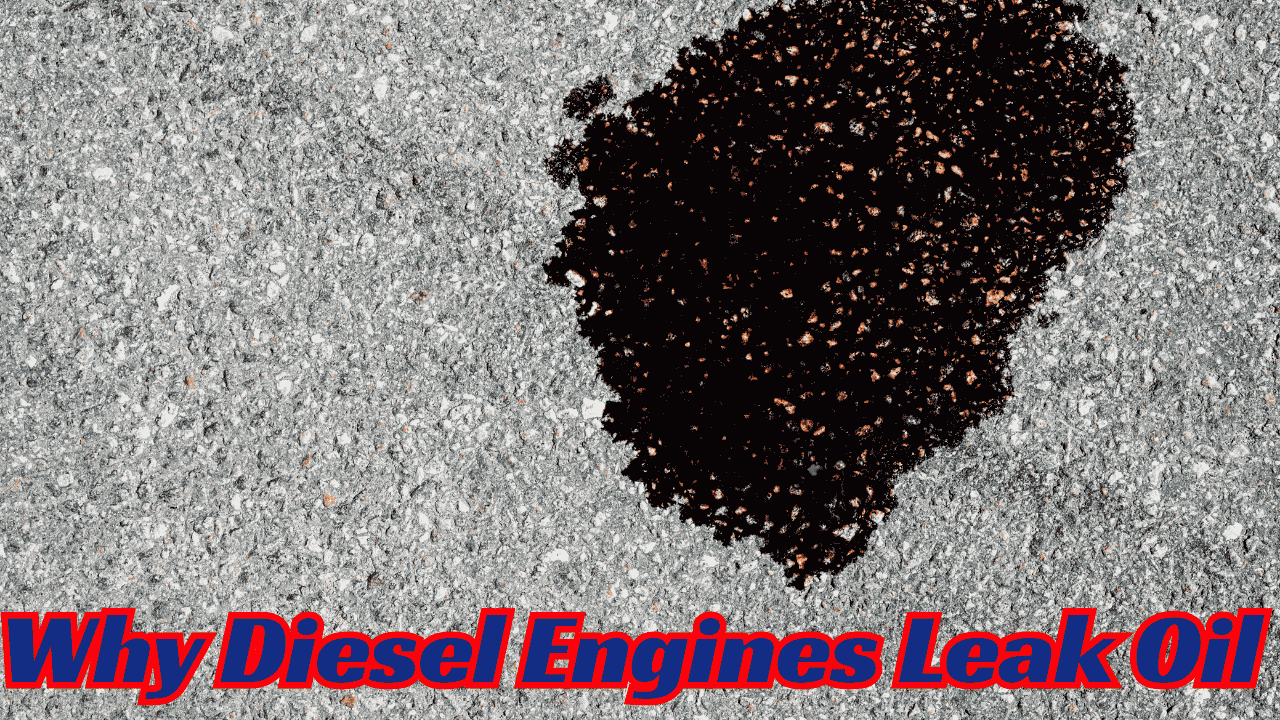Why Diesel Engines Leak Oil | AMSOIL Seal Conditioning, Turbo Pressure & Fixes

Why Diesel Engines Leak Oil | Turbochargers, Pressure & AMSOIL Seal Protection
TL;DR – Why Is Your Diesel Engine Leaking Oil?
Why diesel engines leak oil comes down to crankcase pressure, worn gaskets, turbocharger seals, and poor-quality oil. Turbos force air into the engine, increasing pressure that can push oil past weak or clogged seals. Some drivers think AMSOIL causes oil leaks, but in truth, AMSOIL just exposes existing leaks by cleaning out sludge and buildup. Its seal conditioners help prevent leaks over time. Switch to AMSOIL synthetic diesel oil to stop leaks before they start and extend engine life.
Why Diesel Engines Leak Oil & How to Prevent It
Why diesel engines leak oil is one of the most common concerns among fleet managers, heavy equipment operators, and diesel enthusiasts. Oil leaks can lead to performance loss, turbocharger failure, downtime, and costly repairs. The root causes? High crankcase pressure, old gaskets, turbo oil seal failure, and clogged PCV/CCV systems.
One of the most overlooked reasons for diesel leaks involves the turbocharger, which forces high-pressure air into the engine to increase power. That added pressure creates challenges for gaskets and seals, especially if the oil system isn't maintained.
The best way to stop leaks is by using a high-quality oil like AMSOIL that includes seal conditioners and has strong detergency to prevent sludge buildup. But before we talk about the fix, let's break down why these engines leak in the first place.
How Turbochargers Cause Oil Leaks
Turbos work by compressing air and sending it into the engine for more efficient combustion. But with that performance comes high RPMs, extreme heat, and added pressure on seals.
Where Turbo Oil Leaks Happen:
• Compressor side (intake): Oil seeps into the intake air and gets burned in combustion.
• Turbine side (exhaust): Leaks here send oil into the exhaust, causing blue smoke and DPF clogging.
• External leaks around the turbo housing or fittings.
Common Turbo Oil Leak Causes:
• Worn or failing turbo seals.
• Blocked or kinked oil drain lines.
• High crankcase pressure pushing oil past seals.
• Poor-quality oil forming sludge inside the turbo bearing housing.
Other Common Causes of Diesel Oil Leaks
Gasket & Seal Failure
Heat, vibration, and pressure slowly degrade these components:
• Valve cover gaskets
• Oil pan gaskets
• Front and rear main seals
Crankcase Pressure Build-Up
If the crankcase ventilation system (PCV or CCV) is blocked, pressure builds and forces oil out past seals.
Faulty Oil Filters
Using a low-quality oil filter—or over-tightening it—can lead to leaks at the seal or from cracks in the housing.
Oil Cooler Gasket Leaks
Diesel engines use oil coolers. Gasket failure here can cause external or internal leaks into the coolant.
Drain Plug or Pan Damage
Stripped threads, missing washers, or over-torquing can create steady drips or worse.
Does AMSOIL Cause Oil Leaks? Here's the Deal
Some drivers claim, “I switched to AMSOIL and now my engine leaks.” This leads to the myth that AMSOIL causes oil leaks. But here's the truth:
AMSOIL doesn't cause leaks—it exposes them.
Over time, cheap conventional oils leave waxes, paraffins, and sludge that build up inside the engine, especially around seals. These deposits act like a temporary plug on existing cracks and hardened gaskets. When you switch to AMSOIL, its powerful detergents and cleaning agents begin dissolving that gunk.
Once those deposits are cleaned away, you may notice leaks that were already there—just hidden. That's not a failure; that's AMSOIL doing its job.
And Here's the Good News:
AMSOIL also includes seal conditioners that:
• Soften hardened rubber and restore flexibility
• Reduce existing minor leaks
• Prevent future gasket failure
In the long run, AMSOIL helps seals last longer—not fail faster.
How AMSOIL Helps Prevent Diesel Oil Leaks
Seal Conditioning Additives
AMSOIL synthetic diesel oils are engineered with seal swellers and conditioners to rejuvenate aging gaskets and reduce leaks.
Sludge-Free, Clean-Running Protection
• AMSOIL doesn't break down under heat
• Resists carbon and varnish deposits
• Keeps drain lines, oil galleys, and turbo bearings clean
High Film Strength & Stable Viscosity
AMSOIL maintains its viscosity under load and doesn’t shear down, protecting bearings and seals from pressure spikes.
How to Fix a Diesel Engine Oil Leak
1. Identify the source – Use UV dye or degrease the area and monitor.
2. Check turbo oil lines – Ensure there's no blockage or kink.
3. Replace failing gaskets or seals – Especially valve cover, rear main, or turbo return.
4. Inspect oil filter and drain plug – Reinstall with the correct torque and gasket.
5. Maintain CCV/PCV system – Replace clogged filters regularly.
6. Use AMSOIL synthetic diesel oil – To prevent new leaks and keep seals conditioned.
The Myth | Oil Leaks Are Just Horsepower Trying to Escape
Some old-school techs like to joke, “Oil leaks? That’s just horsepower trying to escape.” It’s a line that gets a laugh in the garage, but the truth is less entertaining. Oil leaks are usually a sign of wear—like hardened seals, brittle gaskets, or pressure imbalances inside the crankcase. They’re not just cosmetic either. Ignoring them can lead to oil starvation, engine overheating, and premature failure.
Instead of brushing it off, it’s smarter to identify the root cause and use preventative measures—like high-quality synthetic oils that condition seals and reduce deposit buildup. Products like AMSOIL are engineered not just to lubricate, but to help keep seals flexible and systems clean, reducing the chance of leaks in the first place.
✅ Check your diesel engine for signs of seepage around the valve cover, rear main seal, or oil pan.
🔧 Not sure if your oil is helping or hurting? Find out why AMSOIL gets blamed for leaks—and what's really going on.
FAQ | Diesel Engine Oil Leaks
Final Thoughts
Why diesel engines leak oil often comes down to high crankcase pressure, turbocharger stress, degraded seals, and poor maintenance. AMSOIL doesn't cause leaks—it uncovers them by cleaning the engine, exposing old issues that were once masked by sludge.
And it doesn't stop there—AMSOIL protects seals, stabilizes oil pressure, and prevents new leaks by using the right chemistry built for heavy-duty diesel abuse.
Want to fix oil leaks the right way?
Switch to AMSOIL and protect your diesel engine the smart way.
Where to Buy / Become a Dealer
Looking to buy AMSOIL?
Powered by Vyscocity
Built by Vyscocity to help you get the job done right — whether you're riding, wrenching, or running a fleet.
Explore our products, try our free tools, and let us know how it works for you.
❓ Still stuck? Ask your question on Facebook →
No fluff. Just function.










